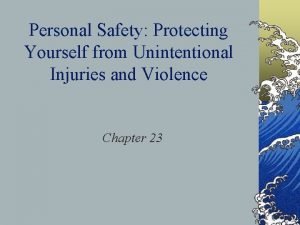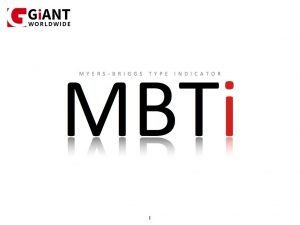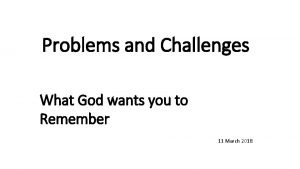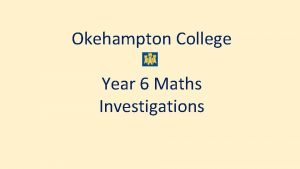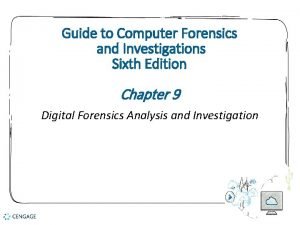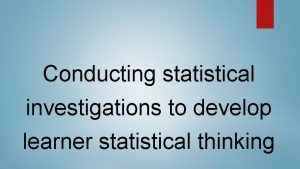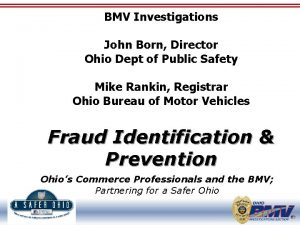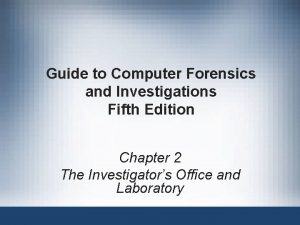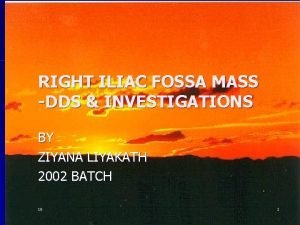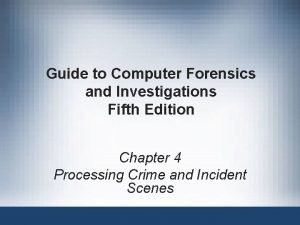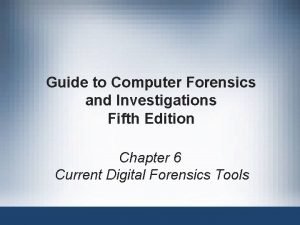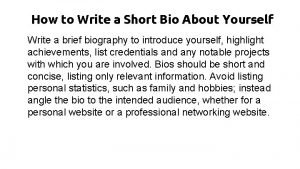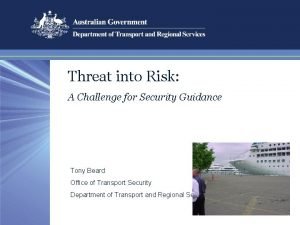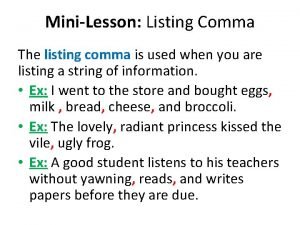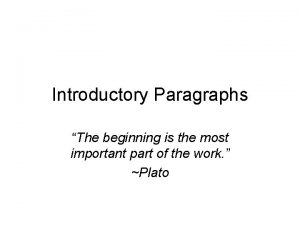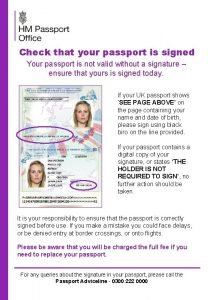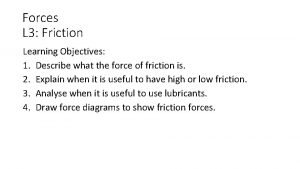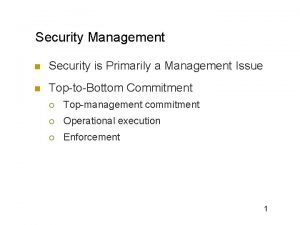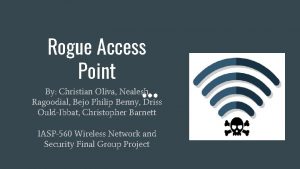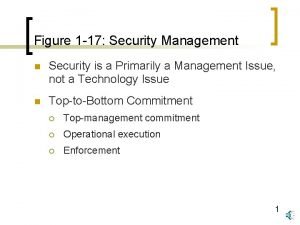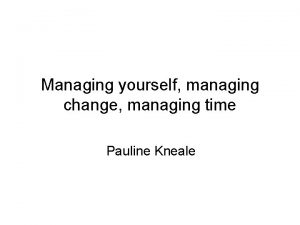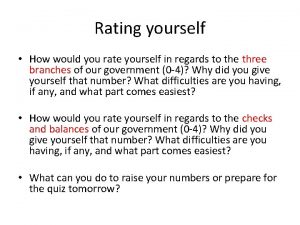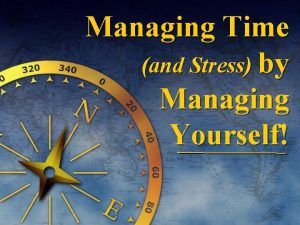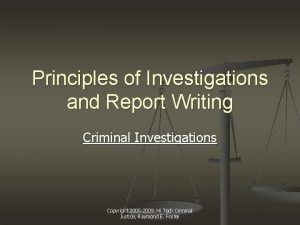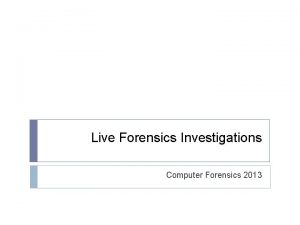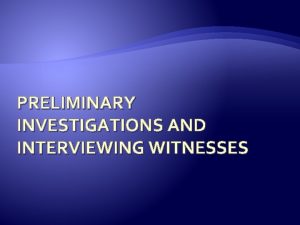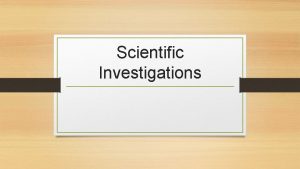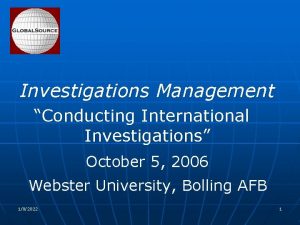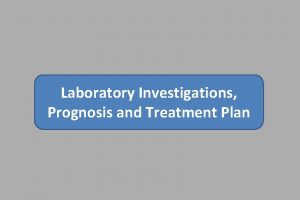Managing investigations To protect yourself you need to














































































- Slides: 78

Managing investigations


To protect yourself you need to be able to evidence that you have followed your due process and that you have been …

The acid test …

Consistency is also key! It helps protect you from allegations of treating people differently and therefore unfairly Some organisations keep a spreadsheet in relation to any disciplinary sanctions they have previously applied They can then be clear about what they did last time …

The purpose of an investigation? Establishing the facts (where possible) is the key objective

The role of an investigator is to be balanced and impartial … You need to approach an investigation with an open mind Beware of confirmation bias … Keep checking in with yourself …

Is an investigation actually needed? Investigations are time consuming and cost money … they tie up busy people who could be better employed doing other things In the first instance employers should consider whether a quiet word or informal action may be all that is required to resolve the matter Sometimes though, it is clear that an investigation is needed …

It is important at the outset to be clear (and define in writing) exactly what it is that needs to be investigated An investigator needs to know this and ensure they stay on track.

Appointing an investigator … What are your considerations? Might look to appoint someone on the same level as the line manager of the person being investigated Where the concerns raised relate to a specific service, (we) generally ask someone who is not involved in the line management of that service Will need to ensure that there are sufficient senior managers (who are not otherwise involved) for any disciplinary hearing …. and potentially an appeal hearing

Appointing an investigator … Make sure you appoint someone who : a) is totally removed from any concern being raised b) won’t be involved in any subsequent hearing. If you don’t, you could compromise the integrity of the investigation.

Might you need to put temporary measures in place? When a concern is brought to your attention, you will need to make a decision around: Is it OK for the person to continue in their current place of work? Should they be moved as a temporary measure? Should they be suspended as a temporary measure?

Suspension should only be used as a last resort, after careful consideration and after other options have been ruled out Suspension pay’ is ‘with

If the decision is made to suspend a staff member, they must be informed in writing that: The suspension is a temporary measure It is not an assumption of guilt It is not a disciplinary action

And if the Safeguarding Team ‘insist’ that you suspend a member of staff? The decision to suspend a staff member and any liabilities associated with it are an issue of employment law It is therefore the decision for the company not the safeguarding team as to whether or not a staff member should be suspended

If the safeguarding team insist on the suspension of a staff member, then it might be worth explaining the situation and asking them to put it in writing that suspending the staff member is their ‘expectation’

When would you involve the police? When a criminal offence has been committed The police have their own priorities and timeframes … potentially it could take weeks (or months) for them to look at an issue

If it is a serious crime it needs to be reported immediately and they are likely to at least begin their investigation quickly In these situations, our job is to make sure that people are safe and to preserve evidence / protect the crime scene

Less serious crimes are unlikely to be prioritised The acas guidance is clear that you can carry out your own investigation … But you need to ensure that you do not compromise any police investigation or prejudice any criminal proceedings … difficult balancing act Possibly you could carry out an initial fact finding mission rather than a full investigation.

Before starting the investigation, the investigator should draw up an investigation plan. This should identify: who the investigating officer is the date the investigation started the purpose of the investigation and what exactly is to be investigated any facts that need to be established who you want to talk to and in what order

what documentary evidence you need to gather any other sources of evidence (e. g. CCTV footage) what policies and procedures need to be referred to the provisional timeframe.

Timeframe is important! Being the subject of an investigation can be a really stressful experience and it can become more stressful the longer the investigation goes on As investigator you want to try and minimise any negative impact has on a person’s wellbeing You are trying to strike a balance between doing the investigation sufficiently thoroughly and trying to conclude it as swiftly as

Looking after people’s wellbeing is important! Do you provide people with an identified point of contact?

Writing to inform … Employees should be given advanced notice in writing of any investigatory meeting they are asked to attend.

This should include the following information: the date, time and place of the meeting the name of the investigating officer the reason for the meeting … including what the allegation is an explanation that the meeting is only to establish the facts of the matter and is not a disciplinary meeting / hearing

a request to keep the reason for the meeting, and any discussions that take place, confidential whether they have a right to be accompanied at the meeting that (if it is a disciplinary investigation meeting) that it may be a disciplinary issue if they unreasonably refuse or fail to attend. Acas provide templates for such

Workers have a statutory right to be accompanied at a disciplinary or grievance hearing by either a work colleague or a trade union representative Whether a worker has a right to be accompanied at an investigation meeting will depend on the circumstances

There is no statutory right for a worker to be accompanied at a disciplinary investigation meeting A worker who raises a grievance has a statutory right to be accompanied at any meeting to hear, gather facts about, discuss, consider or resolve their grievance

However, any other worker interviewed as part of an investigation into a grievance does not have a statutory right to be accompanied at the investigatory meeting Witnesses do not have any statutory rights to be accompanied


What can the accompanying person do and not do?

They can … address the meeting or hearing to put and sum up the person’s case respond on behalf of the worker to any views expressed at the confer with the person during the meeting / hearing.

They cannot … answer questions person’s behalf on the address the meeting / hearing if the person does not want them to Prevent the person explaining their case. Has anyone had any difficulties managing ‘accompaniers’?

Remember: Investigatory meetings must not turn into disciplinary hearings

What do you need to think about when asking questions? For each person you interview. prepare your questions in advance Make sure that these are sufficiently focused and wide ranging to generate the information that you will need Make sure that you only ask topics that relate to the topic you are investigating … do not ‘go fishing’

What types of questions might be useful? Open questions: Encourage people to open up. They can provide a rich source of information that an investigator can then go on to explore in more detail. For example: Explain to me exactly what you saw. . . Describe exactly what happened… Talk me through what you

Closed / specific questions: Usually give a Yes, No or definite answer. For example: What time did you leave your workplace? How many times did that happen? Did you speak to your manager about that? Who else was there? They can be helpful to gather specific facts.

Probing questions: Can test the strength of an interviewee’s account and challenge any inconsistencies … For example: When you say she was aggressive what exactly do you mean by aggressive? You mentioned earlier that X… tell me more about that. Important to phrase these questions so they are inquisitive rather than interrogative.

Feelings questions: Can help to focus an interviewee on what is important to them and reveal their beliefs … For example: What was important to you about that? What is your main concern about what happened? Should be used sparingly as the meeting is mainly to establish the actual facts of a matter

Asking “What else? ”: Helps an investigator to probe deeper beyond the initial information provided. For example: What else can you tell me about what happened? What else do I need to know about the matter?

Summaries: Provide an opportunity to check that the correct information is recorded. For example: So can I clarify that what you are telling me is that you left your workplace at 10 am because there was a problem at home and you did not return to work. Have I got that right? They also allow the interviewee to reflect on what they have said, to correct any inaccuracies and to give further details where there

Questioning approaches to avoid … Interrogative questions: The aim of the investigation is to establish the facts rather than interrogate someone. For example: Instead of “Why did you do that? ”, use “What made you decide to do that? ” Although sometimes necessary, “Why” questions can make people defensive and close up.

Leading questions: These can lead the interviewee to provide the answer the investigator hopes or expects to hear For example: Instead of “Do you think he was perhaps over reacting? ”, use “What did you think of his reaction? ”

Multiple questions: Lead to confusion and the interviewee will answer what they heard first, last or the part they are most comfortable answering. For example: Instead of “What is your role, do you like it and why? ”, ask each question individually.

Any information provided during an investigatory interview that adds another dimension to your existing investigation, or which might warrant further investigation should be captured Sometimes investigations can go in unexpected directions New concerns relating to the existing investigation are likely to fall under the scope of the investigation

if the concerns are unrelated to the current investigation (for example if they relate to another person), then if it is decided that these should be investigated, it is likely that this will need to be done via a separate investigation

What about those ‘I don’t want you to do anything but’ … moments? The bottom line is that if they tell you then you may need to act … Staff need to be aware of that … then they can decide if they want to disclose particular information

Good advice … people can be very good at trying to subvert and derail the process … Anyone had experience of this? Have yourself a checklist of the different areas you need to cover as part of the meeting … go through this systematically until you have covered all the things you need to Make sure you ask and receive responses to all your prepared questions If further questions come to you … write them down and ask them

More good advice … It is your meeting … you are in control If the person is getting animated and unreasonable … call an adjournment … get them to remain in the room and you leave

If a meeting is likely to be contentious or the person is likely to get ‘heated’ then consider having a note taker This person can serve as a witness to the meeting … Their presence may also ‘encourage’ the person to be more measured with their behaviour

The interview notes The investigator may be accompanied by a note taker in an investigatory meeting but more often … not Having the questions already written down and some space to enter answers should help … type as you go if you can If you are unsure check in with the person as you go … ‘have I got this right’?

The notes from investigatory meetings are generally used as people’s witness statements They do not have to be ‘verbatim’ but they should capture as much of the person’s response as possible and include direct quotes where necessary It is very important that they accurately capture all the key points from the discussion

The notes should record: The date and place of the interview The names of people present and their role An accurate record of the interview Any refusal to answer a question Start and finish times and details of any adjournments

An interviewee should be given a copy of the notes taken at the investigation meeting to check that they agree it is accurate This should be done as soon as possible after the meeting so that memories are still fresh.

It is good practice to go over the notes that have taken with the person being interviewed at the end of the meeting Enables the person to hear what you has been written and to either confirm it or to suggest amendments there and then Hopefully reduces the need for any further amendments to be made once the person has received them for ‘sign off’.

Whilst preferable to have a signed hard copy of the notes back from the person, this can sometimes be logistically difficult particularly if you are on a tight timeframe It is OK to accept a version of the notes returned by email with the accompanying email from the person stating that they are happy with the attached version of the notes.

If an interviewee refuses to sign their statement, the investigator should try to find out why and if possible resolve the issue If a resolution cannot be reached, the investigator should include the statement in their report … highlighting that the interviewee refused to sign it and any reasons they gave.

You can give people deadlines for signing notes Be fair and reasonable but don’t allow them to stall the process

Your investigation report An investigation report should cover all the facts that were and were not established It is important to report on all your findings … if you exclude information, you could leave yourself open to accusations of bias Ideally you should be able to report with absolute certainty about what happened but often this is just not possible.

One model for writing the report is to arrange evidence into: Uncontested facts Contested facts Where facts are contested or contradictory, they should determine what, on the balance of probabilities, took place

Unsubstantiated claims Where the investigator is unable to substantiate an allegation, they should consider whether further investigation is reasonable or report that they couldn’t draw a conclusion The report should also highlight any mitigating circumstances that should also be considered.

Structure of an investigation report … Introduction Name and job title of person who authorised the investigation Name and job title of person who carried out the investigation Brief overview of circumstance that led to the investigation Terms of reference / purpose and scope of the investigation and whether this has been amended

Process of the investigation How the investigation was conducted What evidence was collected Whether any pieces of evidence could not be collected and why Names and job titles of all witnesses and why each witness was relevant to the matter Whether any witnesses could not be interviewed and why If a witness statement anonymised explain why has been

The investigation findings Summarise the findings from all relevant documents Summarise the key evidence from each witness statement What facts have been established Whethere any circumstances to consider mitigating Whethere is any other relevant information to consider

Conclusion of report (if required) Recommendation based on all evidence collected Any other recommendations related to the matter Supporting documents Copies of all documents and witness statements collected and referred to in the report should be included and clearly referenced

For smaller investigations a full investigation report may not be necessary However, the findings of the investigation should always be recorded in writing It is worth the investigator checking the template to make sure that they include all the sections that are relevant

The balance of probabilities … Unlike criminal law, an investigator conducting an employment investigation does not have to find proof beyond all reasonable doubt that the matter took place The investigator should try to reach conclusions about what did or did not happen, even when evidence is contested or contradictory.

In these circumstances an investigator will need to decide whether, on the balance of probabilities, one version of events is more likely than the other and to offer their explanation as to why.

Once the investigator has completed their investigation and written up their findings, it is their job to make a recommendation. Recommendations should be restricted to suggesting: Formal action – e. g. a disciplinary hearing changes to policies or procedures further investigation into other matters uncovered

Informal action – e. g. training or coaching for parties involved counselling for parties involved mediation for parties involved notification that further similar action may result in disciplinary action. No further action

An investigator should not suggest a possible sanction or prejudge what the outcome to a grievance or disciplinary hearing will be It should be the decision maker and not the investigator who makes the final decision as to whether or not a disciplinary hearing will be held.

If their decision differs from the investigator’s recommendation, the reasons for this should be written down and included as an addendum to the report.

If it does go to a disciplinary hearing, the person needs to be given a reasonable amount of time to gather their evidence together They may need to gather copies of documents or emails from work … this may need to be supervised but they should be allowed to do this They should be provided with a copy of the investigation report including any witness statements Witnesses should be made aware that this is a possibility … and that they could be called to give evidence

Disciplinary hearings Any thoughts / experiences you would like to share? It should be heard by a different manager from the investigating officer People have a right to accompaniment Do you need to make any reasonable adjustments?

Disciplinary hearings Both the investigator and the person who the concerns relate to are able to call witnesses If the investigator is asked to attend, they are there is a fact giving capacity … They are not there to give their opinion or to present the case against the person.

What would you do if the person failed to attend the hearing? You could potentially hear it in their absence but it might be fairer and more reasonable to adjourn once … something may have happened You could then write to them and let them know if they didn’t attend the next one … you will proceed in their absence.

Disciplinary sanctions Verbal warning … on file for 6 months Written warning … on file for a year Final written warning … on file for two years

 Check yourself before you wreck yourself origin
Check yourself before you wreck yourself origin Battering intentional or unintentional
Battering intentional or unintentional How to protect yourself from bloodborne pathogens
How to protect yourself from bloodborne pathogens Know yourself to lead yourself
Know yourself to lead yourself Myself yourself
Myself yourself Ict in education images
Ict in education images The triangle shirtwaist factory fire commonlit answer key
The triangle shirtwaist factory fire commonlit answer key Wish you a lot of strength
Wish you a lot of strength New speaker new line worksheet
New speaker new line worksheet What should we do to protect our environment
What should we do to protect our environment Unit 9 saving the planet
Unit 9 saving the planet Greek superstitions
Greek superstitions God uses problems to direct you
God uses problems to direct you Angel to protect you
Angel to protect you Why aren t descriptive investigations repeatable
Why aren t descriptive investigations repeatable Nrich maths investigations
Nrich maths investigations Craigslist investigations
Craigslist investigations Guide to computer forensics and investigations 6th edition
Guide to computer forensics and investigations 6th edition Statistical average crossword
Statistical average crossword Types of statistical investigation
Types of statistical investigation Chapter 6 fingerprints
Chapter 6 fingerprints Bmv investigations
Bmv investigations Observation in scientific method
Observation in scientific method Child protective investigations pasco county
Child protective investigations pasco county Chs investigations
Chs investigations Forensics
Forensics Appendiculolith
Appendiculolith Jarrod bowditch
Jarrod bowditch Antenatal investigations
Antenatal investigations Investigations
Investigations Guide to computer forensics and investigations
Guide to computer forensics and investigations Chs investigations
Chs investigations Corinthians 10 12
Corinthians 10 12 Funny pronouns
Funny pronouns Biographical statement about yourself
Biographical statement about yourself If you are to rate yourself using the rubric
If you are to rate yourself using the rubric Teachers open the door you enter by yourself meaning
Teachers open the door you enter by yourself meaning You may ask yourself chapter 8
You may ask yourself chapter 8 What would you change about yourself
What would you change about yourself When i find myself in times of trouble
When i find myself in times of trouble It can be quite busy here during the tourist
It can be quite busy here during the tourist 5 hobbies you need
5 hobbies you need You only need to be lucky once
You only need to be lucky once Attention is all you need.
Attention is all you need. Why the oxford comma is important
Why the oxford comma is important Love is not all you need
Love is not all you need Coherence examples
Coherence examples Argumentative introduction example
Argumentative introduction example Do you have to sign your passport
Do you have to sign your passport Recognizing genre - argumentative text answer key
Recognizing genre - argumentative text answer key Everything you need to know about the odyssey
Everything you need to know about the odyssey When climbing where do you need high friction
When climbing where do you need high friction 1. the space between traffic clusters is called a(n)
1. the space between traffic clusters is called a(n) Chosse the correct answer
Chosse the correct answer Lets be good friends
Lets be good friends You need to make at least 150 sandwiches for a picnic
You need to make at least 150 sandwiches for a picnic Much do you need health
Much do you need health You have need of endurance
You have need of endurance Lord i come i confess
Lord i come i confess All i need is the air that i breathe and to love you abba
All i need is the air that i breathe and to love you abba Mini questions
Mini questions Money is all you need
Money is all you need Lindell cooley i need you more
Lindell cooley i need you more We have only one earth let's protect it
We have only one earth let's protect it The plan-protect-respond cycle
The plan-protect-respond cycle 10 steps to protect heritage places
10 steps to protect heritage places Dsmcsvc
Dsmcsvc Dot
Dot Ibm spectrum protect blueprints
Ibm spectrum protect blueprints Died 3. hali
Died 3. hali You are meeting a large truck on a two-lane road. you
You are meeting a large truck on a two-lane road. you Plastic drape and chemical drape similarities
Plastic drape and chemical drape similarities Animal camouflage
Animal camouflage Ways to protect the ecosystem
Ways to protect the ecosystem Sustaining biodiversity the ecosystem approach
Sustaining biodiversity the ecosystem approach Raspberry pi rogue ap
Raspberry pi rogue ap Juan miguel wants to protect his bicycle parts from rusting
Juan miguel wants to protect his bicycle parts from rusting The plan-protect-respond cycle
The plan-protect-respond cycle Protective earthing conductor
Protective earthing conductor

